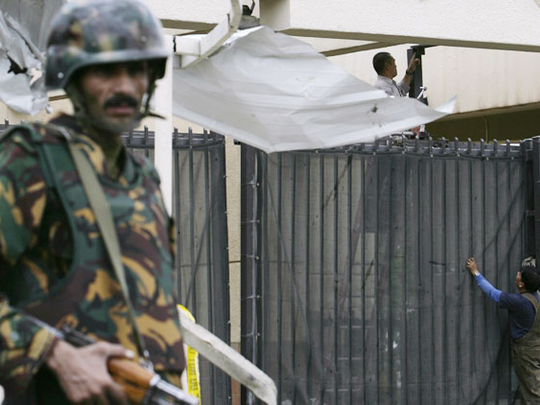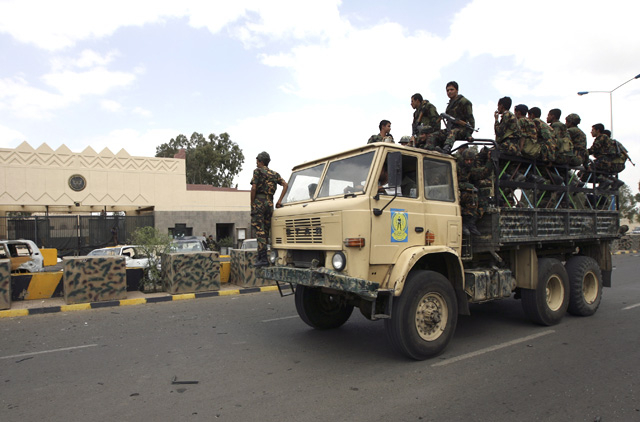
Sana’a: The US and British embassies in the Yemeni capital have extended their closure for a second day because of threats of attack by Al Qaida's offshoot in Yemen.
An officer on duty at the US Embassy in San'a said Monday that the closure remained in force. The Foreign Office in London said the British were also reviewing the situation.
France, Spain restrict entry
The Foreign Ministry in Paris said the French Embassy has been closed to the public since Sunday, though staff were working. The ambassador urged French nationals in Yemen to avoid all nonessential movement in the country and to exercise vigilance. Spain's embassy in San'a restricted access to the public.
The US and Britain closed their embassies in Yemen on Sunday in the face of Al Qaida threats, after both countries announced an increase in aid to the government to fight the terror group linked to the failed attempt to bomb a US airliner on Christmas.
The confrontation with Al Qaida's offshoot in Yemen has gained new urgency since the 23-year-old Nigerian accused in the attack, Omar Farouk Abdul Mutallab, told American investigators he received training and instructions from the group's operatives in Yemen. President Barack Obama said on Saturday that the Al Qaida offshoot was behind the attempt.
Active threat
The White House counterterrorism chief John Brennan said the American Embassy, which was attacked twice in 2008, was shut Sunday because of an "active" Al Qaida threat. A statement on the embassy's website announcing the closure cited "ongoing threats" from the terror group and did not say how long it would remain closed.
In London, Britain's Foreign Office said its embassy was closed for security reasons. It said officials would decide later whether to reopen it on Monday.
The closure comes as Washington is dramatically stepping up aid to Yemen to fight Al Qaida, which has built up strongholds in remote parts of the impoverished, mountainous nation where government control outside the capital is weak.
Over the weekend, General David Petraeus, the US general who oversees the wars in Iraq and Afghanistan, announced that Washington this year will more than double the $67 million in counterterrorism aid that it provided Yemen in 2009. On Saturday, Petraeus met with Yemeni President Ali Abdullah Saleh to discuss coordination in the fight against Al Qaida.
Britain announced on Sunday that Washington and London will back the creation of a new counterterrorism police unit in Yemen. Britain will also host a high-level international conference January 28 to hammer out an international strategy to counter radicalisation in Yemen.
The US also provided intelligence and other help to back two Yemeni air and ground assaults on Al Qaida hideouts last month, reported to have killed more than 60 people. Yemeni authorities said more than 30 suspected militants were among the dead.
The US has increasingly provided intelligence, surveillance and training to Yemeni forces during the past year, and has provided some firepower, a senior US defence official has said. Some of that assistance may be through the expanded use of unmanned drones, and the US is providing funding to Yemen for helicopters and other equipment. Officials, however, say there are no US ground forces or fighter aircraft in Yemen.
On Thursday, the embassy sent a notice to Americans in Yemen urging them to be vigilant about security. and announced the increased counterterrorism aid.
Yemeni security officials said over the weekend that the country had deployed several hundred extra troops to Marib and Jouf, two mountainous eastern provinces that are Al Qaida's main strongholds in the country and where Abdul Mutallab may have visited. US and Yemeni investigators have been trying to track Abdul Mutallab's steps in Yemen, which he visited from August until December 7. He was there ostensibly to study Arabic in Sana'a, but he disappeared for much of that time.
Al Qaida has killed a number of top security officials in outlying provinces in recent months, underscoring Yemeni government's lack of control over the country. Tribes hold sway in the region, and many of them are discontented with the central government and have given refuge to Al Qaida fighters, both Yemenis and other Arabs coming from Saudi Arabia or war zones in Iraq and Afghanistan.
Yemen, the ancestral homeland of Osama Bin Laden and the site of the 2000 bombing of the USS Cole, has a weak central government whose authority does not extend far beyond the capital Sana'a. In addition to battling Al Qaida fighters, it also faces two separate internal rebellions in the north and south.













